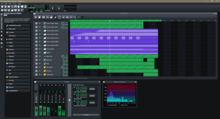LMMS
Free software digital audio workstation From Wikipedia, the free encyclopedia
LMMS (formerly Linux MultiMedia Studio[6]) is a digital audio workstation application program. It allows music to be produced by arranging samples, synthesizing sounds, entering notes via computer keyboard or mouse (or other pointing device) or by playing on a MIDI keyboard, and combining the features of trackers and sequencers. It is free and open source software, written in Qt and released under GPL-2.0-or-later.
 | |
 Screenshot of a project in LMMS 1.2.1 | |
| Original author(s) | Paul Giblock Tobias Junghans[1] |
|---|---|
| Developer(s) | LMMS developers |
| Initial release | 2004; as Linux MultiMedia Studio |
| Stable release | 1.2.2[2]
/ 4 July 2020 |
| Repository | |
| Written in | C++ with Qt[3] |
| Operating system | Cross-platform: Windows, macOS, Linux, Haiku |
| Platform | x86 and x86-64 (Linux, macOS, Windows), only Linux: arm64, armel, armhf, mips, mips64el, mipsel, ppc64el, s390x[3] |
| Available in | 20 languages[4] |
| Type | Digital audio workstation |
| License | GPL-2.0-or-later[5] |
| Website | lmms |
System requirements
LMMS is available for multiple operating systems, including Linux, OpenBSD, macOS, and Windows. It requires a 1.5 GHz CPU, 1 GB of RAM and a two-channel sound card.[7]
Program features
LMMS accepts soundfonts and GUS patches, and it supports the Linux Audio Developer's Simple Plugin API (LADSPA) and LV2 (only master branch, since 24.05.2020). It can use VST plug-ins on Win32, Win64, or Wine32. The nightly versions support LinuxVST. Currently the macOS port doesn't support them.[8][9]
It can import Musical Instrument Digital Interface (MIDI) and Hydrogen files and can read and write customized presets and themes.[10]
Audio can be exported in the WAV, FLAC, Ogg and MP3 file formats.[11]
Projects can be saved in the compressed MMPZ file format or the uncompressed MMP file format.[12]
Editors
- Song Editor – for arranging instruments, samples, groups of notes, automation, and more
- Beat+Bassline Editor – for quickly sequencing rhythms
- FX Mixer – for sending multiple audio inputs through groups of effects and sending them to other mixer channels, infinite channels are supported
- Piano Roll – edit patterns and melodies
- Automation Editor – move almost any knob or widget over the course of the song
- Song Editor
- Beat+Bassline Editor
- FX mixer
- Piano Roll
- Automation Editor
Audio plug-ins
LMMS includes a variety of audio plug-ins that can be drag-and-dropped onto instrument tracks in the Song Editor and Beat+Bassline Editor.
Synthesizer plugins:
- BitInvader – wavetable-lookup synthesis
- FreeBoy – emulator of Game Boy audio processing unit (APU)
- Kicker – bass drum synthesizer
- LB302 – imitation of the Roland TB-303
- Mallets – tuneful percussion synthesizer
- Monstro – 3-oscillator synthesizer with modulation matrix
- Nescaline – NES-like synthesizer
- OpulenZ – 2-operator FM synthesizer
- Organic – organ-like synthesizer
- Sf2 Player – a Fluidsynth-based Soundfont player
- SID – emulator of the Commodore 64 chips
- TripleOscillator - 3-oscillator synthesizer with 5 modulation modes: MIX, SYNC, PM, FM, and AM
- Vibed – vibrating string modeler
- Watsyn – 4-oscillator wavetable synthesizer
- Xpressive - mathematical expression parser synthesizer (only in alpha)
- ZynAddSubFX
Other plugins
Standards
- Musical Instrument Digital Interface (MIDI)
- SoundFont (SF2)
- Virtual Studio Technology (VST)
- Linux Audio Developer's Simple Plugin API (LADSPA)
- LV2 (only master branch, since 24.05.2020)
- Gravis Ultrasound (GUS) patches (PatMan)
- JACK Audio Connection Kit (JACK)
- ZynAddSubFX
Audio output examples
See also
References
External links
Wikiwand - on
Seamless Wikipedia browsing. On steroids.





